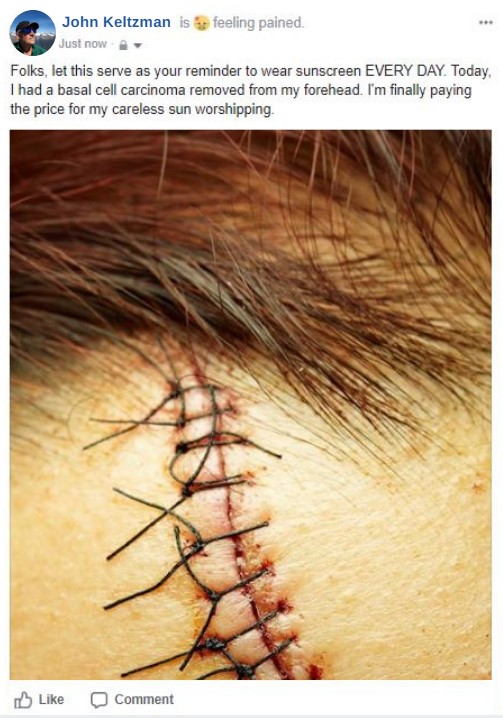Your friend has just been diagnosed with skin cancer, and that has you worrying about a spot on your skin. How can you tell whether it’s harmless, or potentially more serious?
You’re scrolling through your social media feed on a Saturday morning when you see a post from one of your old friends:

As you reach forward to type your “get well” message, a mole on your forearm comes into view. You’ve had the mole since you were a teenager, but now you wonder whether it could be skin cancer. After all, you and John grew up together; you spent your summers on the beach, often competing to see who had the “best color.” You’ve both learned your lesson about the dangers of tanning. Now he has skin cancer. Are you at risk, too?
Before you panic, take a look at your mole and ask yourself the following questions:
- If you draw a line down the center of your worrisome spot, are the two halves different? Are they asymmetrical?
- Are the borders of your spot uneven or jagged?
- Does the mole have multiple colors in it?
- Is your mole larger in diameter than a pencil eraser? Is it dark in color?
- Has the mole evolved or changed over time? Has it has gotten large, more raised or itchier?
- Does the mole look different from the others on your body?
- Have you gone more than a year without a visit to your dermatologist?
If you answered yes to any of the above questions, make an appointment with your dermatologist and be sure to share your concerns. And even if you answered, “I don’t know” to one, go ahead and make the call. While a “yes” or an “I’m not so sure” response in no way guarantees that you have skin cancer, it means there may be cause for concern.
Another question that doesn’t speak to the technical warning signs but is nevertheless important is, “What is your gut telling you?” We often hear from skin cancer patients who didn’t exhibit the classic ABCDE signs of melanoma, but they trusted their instincts that something wasn’t quite right and made an appointment with a dermatologist. You know your body best, and when it comes to your health, you should be your own advocate. When you see something new, changing or unusual on your skin, get it looked at right away. When it doubt, check it out.
It’s important to remember that just because your friend has had skin cancer, it doesn’t mean that you’ll receive the same diagnosis. But his post is a valuable reminder: Every person, regardless of age, gender or skin tone, is at risk for the world’s most common cancer. In fact, one in five people in the U.S. will develop skin cancer in their lifetime. Daily sun protection, combined with annual visits to your dermatologist for a complete skin exam, are the best ways to prevent it. (Along with interim visits if your gut tells you something is not right.) So heed John’s advice and lather on that sunscreen, but don’t stop there. Always wear UV-protective clothing, a wide-brimmed hat and UV-blocking sunglasses, and seek the shade.




